
RITA MORENO
Puerto Rico-born Rita Moreno — winner of the 1975 Tony Award for Best Featured Actress in a Play for her turn as Googie Gomez in The Ritz, the Academy Award for playing Anita in the film "West Side Story," the Emmy for her work on "The Muppet Show" and "The Rockford Files" and the Grammy for "The Electric Company Album" — recently returned to Berkeley Rep for the first time since a sold-out run in The Glass Menagerie in 2006. It was actually during her run in Berkeley's 2004 production of Master Class that the acclaimed actress, who is also featured in the new Fran Drescher TV series "Happily Divorced," was awarded the Presidential Medal of Freedom, the highest honor given to a civilian in commemoration of a lifetime of meritorious service; in 2010, President Obama awarded Moreno the National Medal of Arts. And, now, all of those honors as well as her 79 years as an actor, singer, dancer, mother, wife and friend are being explored with dramatic effect in Rita Moreno: Life Without Makeup, a music-kissed biographical show currently playing Berkeley Repertory Theatre's Roda Theatre through Nov. 12 in Berkeley, CA. I recently had the chance to chat with the gifted artist, who spoke candidly about the creation of the critically acclaimed Life Without Makeup, which was written by Rep artistic director Tony Taccone and staged by David Galligan; that interview follows.
Question: How did the idea for Life Without Makeup come about?
Rita Moreno: It came about because I used to regale the artistic director of Berkeley Rep, Tony Taccone... with stories. We had lunch. We made friends when I started working there. I love working for non-profit theatre. I sort of insinuated my way into the Berkeley Rep. I played Maria Callas in Master Class, and then I played Amanda in Glass Menagerie. Those plays were hugely, hugely successful. At one point, I think it was after Master Class, he called me and said, "You've got to do your story." And, I literally, innocently said, "What do you mean?" He said, "I think you should do your story—your life story—in play form." Without even thinking twice, I said, "Oh, yuck! Ew. Ew. No. No. Please. God. No!" He was really kind of astonished at the reaction.
| |
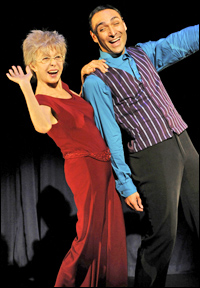 |
|
| Moreno and Salvatore Vassallo in Life Without Makeup. | ||
| photo by Kevin Berne |
Question: That was going to be my next question. How did the two of you work together?
Moreno: He had a laptop, his assistant Mia had her laptop, and they had a couple of recorders—tape recorders—and that's how we did it. It took, really, a good year and a half because it was not like we would be doing it every single day, but when we would do it—when we would meet—it would be for three or four hours, which is really, surprisingly exhausting.
Question: Tell me about what the title means.
Moreno: It's really life—my life—without any artifice. [Tony] came up with it. He offered a bunch of titles, and it all had to do with makeup, interestingly enough, all of them, and this one, everyone immediately said, "That's the one." It's a perfect, suitable and appropriate title. It starts with my coming to America, specifically New York City, by ship from Puerto Rico, and we have an actual photograph of the ship. It's marvelous. Someone gave me a gift about four years ago of the picture of the S.S. Carabobo, and they also gave me the Hall of Records, and I just burst into tears—my name and my mom's name on the list of passengers. The passenger list. Isn't that amazing? It's an astonishing gift. I wish we could put that up. I was thinking of putting that in the lobby—making a big blowup of it.
| |
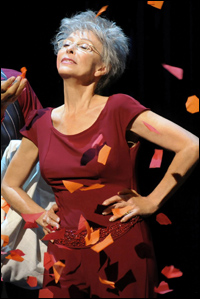 |
|
| Moreno in Life Without Makeup. | ||
| photo by Kevin Berne |
Moreno: I was just barely five.
Question: Do you remember the journey?
Moreno: Oh, do I! I describe it in the play. We hit a violent storm, so it took us, literally, from Puerto Rico, which seems so close, it took us days and days to reach the shores of the United States… These were old ships… It was probably bobbing around like a cork. We were just stuck at sea for many, many days, and I describe that whole thing, and finally seeing the Statue of Liberty, which was astonishing. I see this huge, enormous green lady just literally jumping out of the middle of the ocean reaching up to what looks like the top of the sky and holding out what looked to me like a giant, flaming ice cream cone. And, I really thought, "Oh, my goodness. A lady runs this country." In Puerto Rico when there is a statue, it's usually somebody who runs that town. The mayor or some very important benefactor, so I assumed she was a benefactor at least.
Question: Now that you've been doing the show, what's been the greatest challenge of it?
Moreno: Oh, remembering this sucker! Oh, man, at 79 this is not easy. I was trying to learn some of it while I was doing the series "Happily Divorced," and that turned out to be impossible. And, we are talking about 90-odd pages of single-spaced type. If you listen to Elaine Stritch when she was doing her play, she would say, "So?!" [Laughs.] I could just see her saying it, "So!" But, she was younger… It's been very tough. Still learning. And, you know, people keep saying, "Well, it's your life," but it's not my life. It's a different kind of life. Things taken out of context because we want an arc that works properly for the play. It's not like from the minute I was born to the minute right now, here. It doesn't work that way. You can't do that, so some of it is in order and then suddenly some of it is not.
Question: On the flip side, what's been the greatest reward or joy of doing it so far?
Moreno: The dancing… I have a brand-new left knee. And, it's a real new one; it's not injections. I just decided that the first number—because we talk about "Singin' in the Rain" and my doing that movie with Gene Kelly, and even though I had a very small part, it's a very memorable film for me—we do a song from it called "Broadway Rhythm." … "Broadway rhythm. It's got me. Everybody dance." It's a marvelous number, so I said, "Why don't we do it [wiht] tap and period kind of steps, you know with hands that tremble." You know those hands? You would shake your hands, so it's a fun, wonderful number. It's killing me, but it's so much fun. [Laughs.] We do a piece of "America" and a piece of "Mambo at the Gym," so it's filled with surprises for the audience.
| |
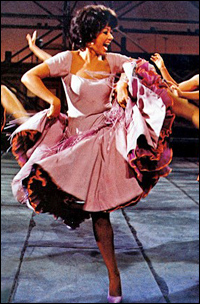 |
|
| Moreno in "West Side Story." | ||
| MGM |
Moreno: That I am one of the most resilient people I've ever met in my whole life! [Laughs.] Everyone around me agrees and is constantly saying so, so it must be so. I'm also one of the most frightened people in the world. I really get serious, serious stage fright. Not so serious that I don't go on… I've had to work that one out, and I've had to figure out why. I had a session with Tony Taccone where he said to me, "You're not performing. What the hell are you doing during rehearsals?" And, he talks that way, and that's great. I love it because I can trust him. He's tough and he's very honest and direct, and I said, "I don't know." He said, "Let's examine this. What's going on?" And, at some point, I burst into very quiet little sobs, which I had apparently been holding in. I wasn't even aware of that, and then he said, "Why are you crying?" And, I said, "I don't know." And, here we have this 79-year-old woman who is taking over a show, and he finally figured it out. He said, "Well, what is it about doing this? I know you're scared. I know you're very, very scared." I said that out loud many times, and I finally realized something very important to me. I said, "I'm afraid I'll disappoint everyone"—it was through my tears, and he just stared at me… "You're afraid you're going to disappoint everyone?" And, I just nodded. I couldn't even speak. I was hiccupping, you know, with sobs, and he said, "That's so interesting. That's so much a part of your story in the play. It's so much a part of your story. You don't want to disappoint." And, that's different from wanting to please, by the way. That's very, very different. Don't even ask me to explain, but it's very different. He and I had a big, big heated discussion one day about the difference between the words jealous and envious because I told him I was envious of this very lovely young actress. It's something that we deal with in the play, and he kept writing the world jealous, and I said, "No. I'm not jealous." You're jealous of someone if she is a girlfriend on the sly. That's jealousy. Envy is something completely different. Envy means you want to be like them. He said, "Oh! Oh God, women." [Laughs.] Question: How has audience reaction been?
Moreno: Ah! Oh my God! They laugh real hard. There is a lot of humor in failure, also, which is one of the first things that Tony said to me while he was trying to talk me into doing my [story]. There's something about failure that can be hilariously funny. It's how people manage to survive. The Jews have done it for a millennia, the Irish, the Hispanics, everybody. It's the one way you can really survive, just to be able to laugh at terrible situations. I describe some really awful situations that are hilarious, and I describe other awful situations that are extremely poignant and heartbreaking because of the way I was treated in Hollywood when I was a young girl, and there are tears. There are people who get tears in their eyes because it's a very sad thing. I grew up thinking that I had no value. It's no accident that I eventually ended up, luckily, in psychotherapy. That whole discovery—that revelation—with Tony was so important to me. I will always remember from now on what it is that stops me… And, I really, honestly, was not aware. I was not cognizant of that. I do not want to disappoint as a performer. Not as a person. That's a whole other thing. That's different.
| |
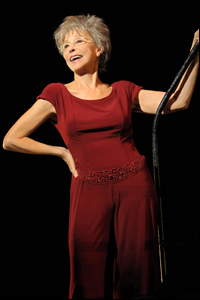 |
|
| Moreno in Life Without Makeup. | ||
| photo by Kevin Berne |
Moreno: We hope so at some point. What I really want to do is go to some cities. I do not want to go on a tour. Listen, I'm going to be 80 in December, but I want to go to certain places that will be helpful to me. L.A. would be one, probably Seattle. Places like that, that are very interesting—Chicago—and refine it. Four weeks is nowhere near enough for a show of this breath. This is a really big show. And, we have a fabulous set designer… Anna Louizos… she did a gorgeous, gorgeous job. I want to refine it… I wanted to try it out first elsewhere and then bring it to Berkeley. I wanted it to be stage ready for Berkeley, but [Tony] said, "No, no, no. Can't do that." Can't afford that, so now, of course, people are hearing about the success of it, and there have been a number of inquiries from all places.
Question: That's great.
Moreno: Yeah, it is great. It's fabulous. I wish my husband was here to see it. He tried so hard to help me out in his lifetime and it just didn't work. I just had to get older for some peculiar reason. The stars have aligned. I feel like this year's Betty White.
Question: You're also writing a book, right?
Moreno: I'm going to. I'm not doing it yet.
Question: What's that going to be?
Moreno: It's going to be the same thing, but in more detail. We had to cut out such great, great stuff. The show is two hours as it is, and we have to cut some stuff in the show now, which we will be doing I guess before we close—maybe not, maybe we'll do it after we close. We're already getting extended, which is fabulous, so it's doing well, and I couldn't be happier. I have to stop at a certain point because we start our second season for "Happily Divorced" in the middle of January. It's done really, really well. The ratings actually went up after we finished our first season.
| |
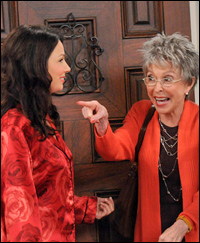 |
|
| Moreno with Fran Drescher in "Happily Divorced." | ||
| TV Land |
Moreno: Oh, it is blissful! Fran is just a darling woman. She's generous, she's warm, she's funny, and the set reflects it. You can always tell because it always comes from the top. If it's a cranky set, it comes from the top, I promise you. If it's a happy set, it comes from the top also.
Question: This year marks the 50th anniversary of the "West Side Story" film.
Moreno: I know!
Question: What memories do you carry from working on that?
Moreno: Nothing but sheer hard work. I've never worked so hard in my entire life… I don't even know how I managed to pass the dance audition. I hadn't danced at that point for, oh my gosh, I would say 15 years, something like that, and I was never that kind of dancer anyway. I was never a great dancer by any stretch of the imagination. I'm still not a great dancer, and that's okay with me. I will leave that to the great dancers like Sutton Foster and Chita [Rivera]—people like that. I have never been a great dancer. I enjoy it! So, I did audition. I worked real hard before the audition, and the stars were aligned for that one. I passed the acting audition; I knew I was in in that respect, and the singing was okay—that was good—but the dancing is what scared the hell out of me. Then Jerome Robbins took over and remade my entire body—bone-by-bone, joint-by-joint. [Laughs.]
Question: When you look back on your stage career, do you have a favorite theatrical experience?
Moreno: I didn't have much of a stage career, actually, so no. [Laughs.] You know what, that's not fair. I would like to count summer theatre because I did some stuff in summer theatre and regional theatre. I did The Rose Tattoo in regional theatre, which was very successful, at the Long Wharf. For them I also did another one. I played Scapino, and I played Katharina in The Taming of the Shrew. People are always surprised at how much theatre I've actually done that's not Broadway theatre… but it's theatre. It's the real theatre. I did Gypsy, I did Steel Magnolias with my daughter, Prisoner of Second Avenue… all kinds of stuff. Scapino was really fun because I looked like a little tiny Italian man with a little mustache in an ice cream suit.
Question: What would you say you're proudest of about your career?
Moreno: That "I'm Still Here," like the song says. Not only still here, but working. Still here and working. That's sensational. I really never thought I would do TV again except for an occasional guest-spot here and there, and when the series actually happened, I just thought, "Wow! The stars are aligned." To have a featured role in it is fine with me. The one thing, it gives me the opportunity to be with my grandchildren and my daughter, with whom I'm extremely close, so that works out perfectly. I'm also working with a theatre actor, Robert Walden, who plays my husband. What could be bad?
[For tickets or more information about Life Without Makeup, call (510) 647-2949 or toll-free at (888) 4-BRT-Tix, or visit berkeleyrep.org.]
Well, that's all for now. Happy diva-watching! E-mail questions or comments to [email protected].











